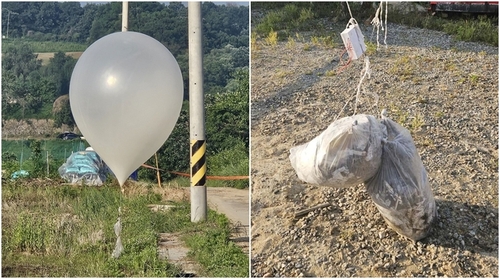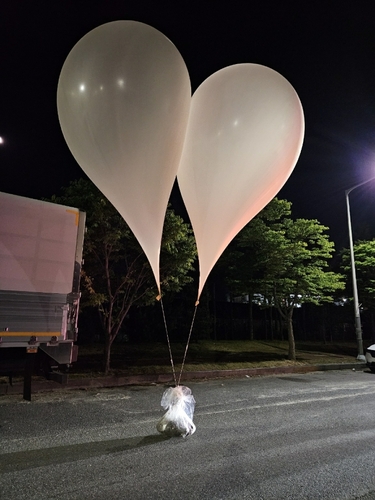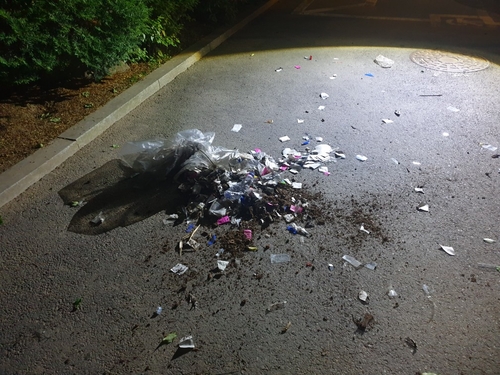- California Assembly OKs highest minimum wage in nation
- S. Korea unveils first graphic cigarette warnings
- US joins with South Korea, Japan in bid to deter North Korea
- LPGA golfer Chun In-gee finally back in action
- S. Korea won’t be top seed in final World Cup qualification round
- US men’s soccer misses 2nd straight Olympics
- US back on track in qualifying with 4-0 win over Guatemala
- High-intensity workout injuries spawn cottage industry
- CDC expands range of Zika mosquitoes into parts of Northeast
- Who knew? ‘The Walking Dead’ is helping families connect
N. Korea sends over 260 balloons carrying trash into S. Korea: Seoul military
North Korea has launched hundreds of balloons carrying trash and manure across the inter-Korean border, Seoul’s military said Wednesday, after the North warned of “tit-for-tat action” against anti-Pyongyang leaflets sent by the South’s activists.
As of 4 p.m., the Joint Chiefs of Staff (JCS) said it had detected some 260 balloons sent from the North since Tuesday night, which fell in various locations across the country, including border areas, Seoul and even the southeastern province of South Gyeongsang.
It marked the largest number of North Korean balloons sent into the South, compared with previous similar instances between 2016 and 2018, the JCS said, noting that none of the balloons were still floating in the air.
The fallen balloons appeared to have carried various pieces of trash, such as plastic bottles, batteries, shoe parts and even manure, a JCS official said, with no major damage being reported so far.
Later in the day, Kim Yo-jong, the powerful sister of North Korean leader Kim Jong-un, issued a statement “politely requesting Seoul’s understanding,” citing limitations in controlling North Korean citizens from sending balloons into the South.
She emphasized the North was simply exercising its freedom of expression, mirroring the rationale previously given by the Seoul government for its inability to halt anti-North Korean activists from launching leaflets across the border.
The balloons are “whole-hearted gifts” for the South Koreans “who cry for freedom of speech” and they will have to keep picking them up, she said in the statement carried by the official Korean Central News Agency.

The military deployed personnel from chemical, biological, radiological and nuclear response teams and bomb disposal units to collect the objects for a detailed analysis.
“These acts by North Korea clearly violate international law and seriously threaten our people’s safety,” the JCS said. “(We) sternly warn North Korea to immediately stop its inhumane and vulgar act.”
The United Nations Command is conducting a formal investigation into the matter, which the Neutral Nations Supervisory Commission will observe to provide third-party oversight, the U.S. Forces Korea said in a statement.
The North’s military action of deploying mass numbers of trash-carrying balloons that can cause harm to local populations is not only offensive and unsanitary but constitutes a violation of the Armistice Agreement, it said.
According to regional authorities, a series of suspected North Korean balloons were found and reported in many parts of the South, including as far south as the southeastern county of Geochang, 218 kilometers south of Seoul.
A vineyard owner in Yeongcheon, about 250 km from the border, reported to police early Wednesday morning that he heard a thumping sound and went out to find a heap of plastic waste and filth, which had damaged a plastic greenhouse on his farm.
Earlier in the morning, a plastic bag filled with waste paper and plastic bottles was found dangling from two floating balloons in a rice field in Geochang. Police in the southern county of Muju were alerted about a balloon stuck between utility pole cables, carrying a similar plastic bag.
Such plastic bags found elsewhere overnight reportedly contained manure, batteries, pieces of shoes and other waste.
Police were trying to determine whether the retrieved materials were those sent by North Korea.
The JCS advised residents in the areas not to touch the objects and to report them to nearby military or police authorities upon their discovery, and cautioned of possible damage from the balloons, citing property damage due to such balloons in 2016.
It said that it will come up with safety measures with the police and the government, noting that it is cooperating with the U.S.-led U.N. Command overseeing activities in the Demilitarized Zone separating the two Koreas.

On Sunday, North Korea said it will scatter “mounds of wastepaper and filth” over the border areas in a “tit-for-tat action” against the distribution of anti-Pyongyang leaflets.
For years, North Korean defectors in South Korea and conservative activists have flown the leaflets to the North via balloons to help encourage North Koreans to eventually rise up against the Pyongyang regime.
North Korea has bristled at the propaganda campaign amid concern that an influx of outside information could pose a threat to its leader Kim Jong-un.
North Korea has repeatedly called for an end to the leafleting campaign. The issue has long been a source of tension between the two Koreas, which are still technically at war because the 1950-53 Korean War ended in a truce, not a peace treaty.
Meanwhile, the South’s military also detected attempts by North Korea to jam Global Positioning System (GPS) signals near the de facto inter-Korean sea border in the Yellow Sea early Wednesday, another JCS official said, noting that they did not impact the military’s operations.
The North’s moves came amid heightened tensions on the Korean Peninsula after Pyongyang’s botched attempt Monday night to launch its second military spy satellite into orbit. The launch failed due to the explosion of the rocket during its first-stage flight, according to the North’s state media.
South Korea, the United States and Japan have condemned the latest launch, calling it a violation of U.N. Security Council resolutions banning the North from any such launches using ballistic missile technology.









![일본 사도광산 [서경덕 교수 제공. 재판매 및 DB 금지]](http://www.koreatimesus.com/wp-content/uploads/2024/07/PYH2024072610800050400_P4-copy-120x134.jpg)


